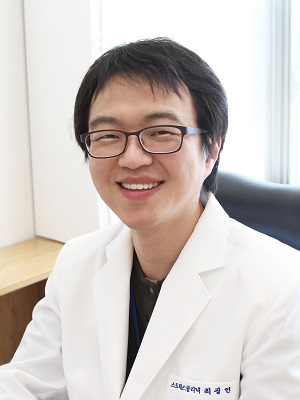As new freshmen are filling the campus with vibrant energy, we realize that changes can be good. Such changes occurred not only in the student community but also at the KAIST Clinic Pappalardo Center (E21): a new psychiatrist joined the Stress Clinic. The KAIST Herald met with Kwang Yeon Choi for further information.

Please briefly introduce yourself.
Hello. My name is Kwang Yeon Choi, and I am the new psychiatrist at the KAIST Clinic Pappalardo Center. I started working at KAIST’s Stress Clinic just this month. I graduated from Korea University College of Medicine and am currently enrolled in KAIST Graduate School of Medical Science and Engineering. I am conducting a research on neuroscience and at the same time, give medical treatments in the Stress Clinic on Wednesdays.
How did you come to join the KAIST Clinic as a new psychiatrist?
I have previous experience of giving medical treatments in a hospital for four years. Afterwards, I separated from clinical practice and focused on my research about the mechanisms of memory. However, I hoped to practice clinical treatments as well as continue my research, so that brought me here to the KAIST Clinic.
Can you explain about the Stress Clinic in KAIST?
There are two other psychiatrists working at the Stress Clinic. Students can first make appointments before visiting via the Internet or phone calls. Recently, there has been an increase in the numbers of students visiting the clinic because of their diagnosis of high levels of stress in their regular medical checkups. There is a variety of visiting patients, including those with stress from academic performances, personal relationships, concerns of future career, insomnia, and even suspected alcoholism. Also, many students later get diagnosed with depression that requires further treatment. Depression is a very common disorder, as it is often referred to as “our mind’s flu,” that can be recovered through proper pharmacotherapy and psychotherapy. However, it is important for patients to have the will to overcome the social stigma on people with mental illness and actively get help with depression, or else depression can have a negative influence on the daily lives of patients and even leave permanent scars on one’s heart.
It can be confusing for some students to figure out the appropriate time to get some help and visit the Stress Clinic. When should that be?
Compared to foreign cases, Koreans tend to seek for help when their depression is much developed. Not many people get help during earlier states but, like any illness, proper treatment at an earlier state of depression is very important. In fact, it can really boost the recovery rate and lower the recurrence rate. It is best to have a medical checkup for depression when you experience the following symptoms for more than two weeks: loss of interest in the daily life, loss of appetite, sleep deprivation, loss of memory, and lack of concentration. In addition to these symptoms, if you have difficulties in your studies and finding reasons to live, it is required that you visit our clinic. These symptoms most likely occur because depression limits your ability to make clear. With proper treatment you can recover from depression, and it can really change how you perceive the world and yourself. You can always get a Korean version of Beck Depression Inventory (BDI) on the Internet to check your depression level. If you score high on this checkup, I highly recommend that you visit our stress clinic and get help through consulting.
What sets the KAIST Stress Clinic apart from other hospitals?
As the KAIST Clinic is a clinic for the student community and the goal of the clinic does not lie in pursuing profits, patientscan have 15 to 30 minutes of individual care. This is a big difference from other hospitals, and I think it is very lucky for KAIST students to have an easy approach to such a good clinical environment.
Can you give some advice to students on relieving stress and having healthier minds?
First of all, it is important to have a healthy and regular life pattern. Get some sleep, exercise moderately, and have healthy relationships with friends and peers. It is more important to have a balanced life than to focus on only one or two things. Furthermore, do not pay too much attention to what others think. Set standards based on yourself alone, not by comparing yourself to others, and try to satisfy those standards. It is less stressful and more sustainable when you try to become a better person compared to your past self rather than others. On the other hand, stress is ubiquitous and inevitable. Adequate levels of stress can help a person concentrate on a task, so I suggest you to take advantage of stress. If you can manage stress well, then stress can help you grow up.
Ah Hyun Kim
ahhyunk@hanmail.net

